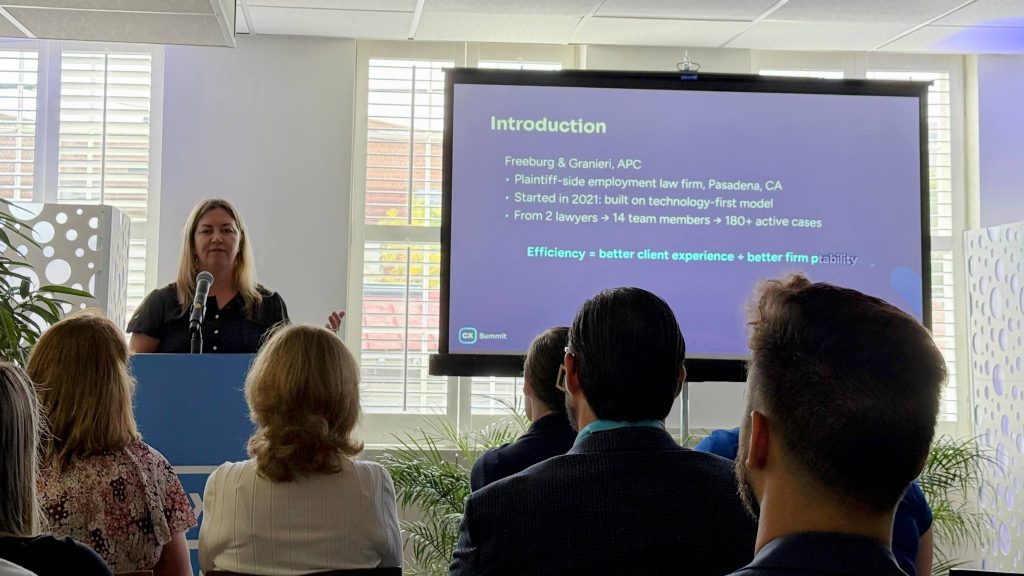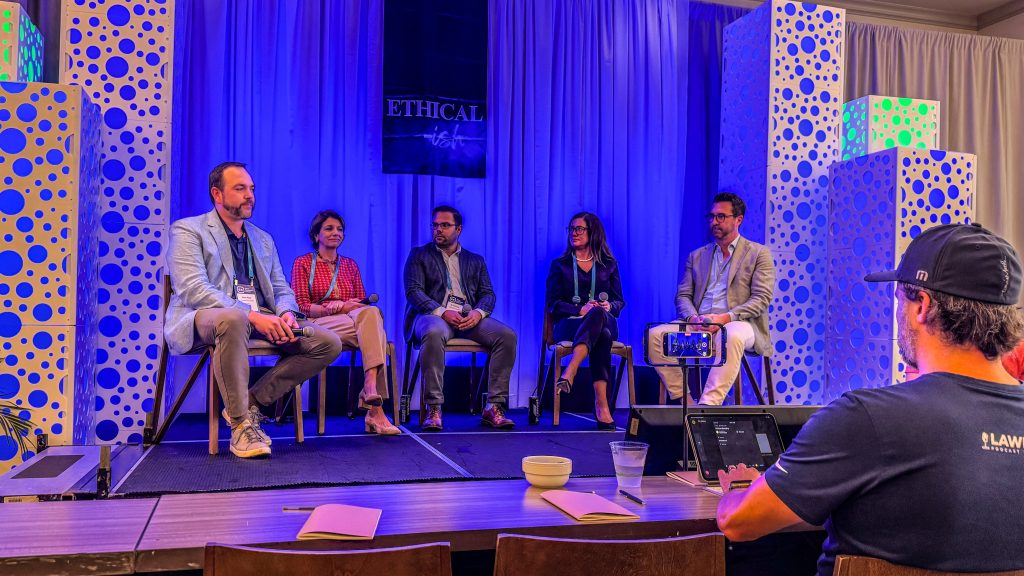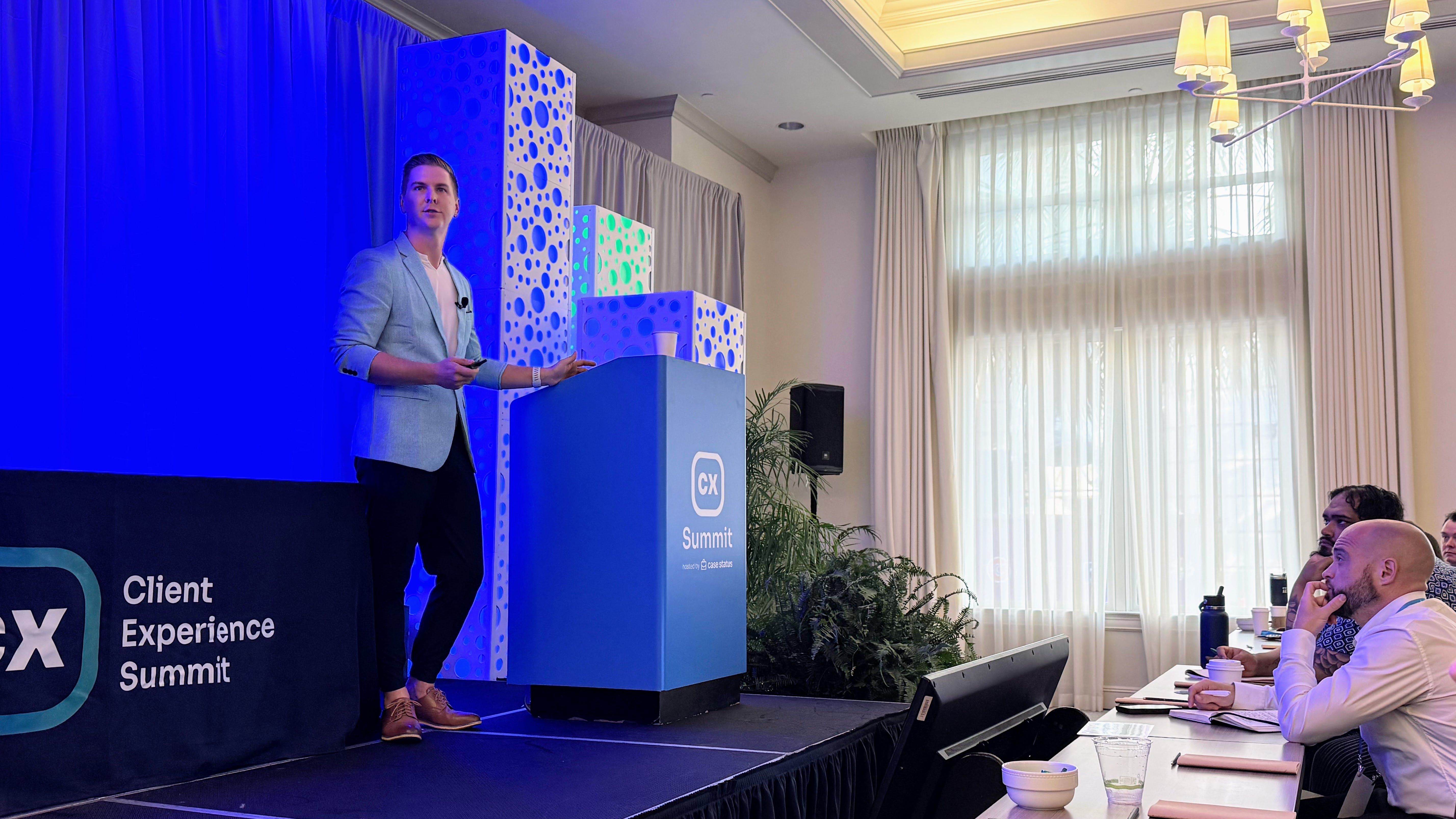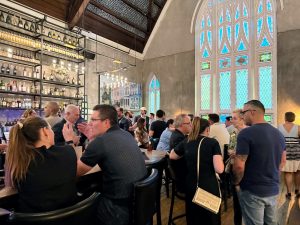For the second time in a month, I attended a first-time conference. And, once again, the inaugural conference exceeded my expectations.
Several weeks ago, I wrote about Kaleidoscope, the debut conference produced by 8am. This time, I found myself at the Client Experience Summit, the inaugural conference of the legal technology company Case Status, held in its hometown of Charleston, S.C., Sept. 24-26.
As the legal tech conference landscape becomes increasingly crowded – in this month alone, there are multiple conferences every single week – a counterintuitive trend is emerging: smaller, customer-focused conferences are also delivering value, but in a more targeted way.
The Power of Focus
The two-day summit centered on a single, critical question: How can law firms improve their clients’ experience? As cofounder and CEO Andy Seavers (pictured above) said in his opening keynote, “Without the client, there is no case. Without the client, there is no firm. This is a client business and we need to put an emphasis on the client.”
This was not a sprawling event trying to be everything to everyone. Instead, it brought together practitioners from small and medium-sized firms – mostly focused on personal injury, immigration, family, and employment law, and all united in their interest in better serving their clients.

Employment lawyer Christy Granieri said her “technology-first” firm will not accept clients unwilling to use the Case Status app.
This targeted approach created something you do not always find at larger legal tech conferences: opportunities for peer-to-peer learning and sharing. When one speaker, the leader of a California employment firm, described her practice as “a Case Status firm” – going so far as to say she will not take clients unwilling to use the app – you could almost sense it resonate with others in the room.
What Made It Work
Much like the Kaleidoscope conference, this first-time summit felt polished and professional. Among the elements that made it so:
- Practical knowledge from practitioners. The speaker lineup featured attorneys and firm leaders who are actively involved in running their own practices. That meant that the programs offered battle-tested insights from people who do this stuff on a daily basis. Sessions covered client experience, client service, technology integration, and sustainable firm growth, all grounded in actual experience.
- Two complementary tracks. The summit offered two complementary tracks. The “Future-Focused” track examined client experience as a long-term growth engine and strategic differentiator, while the “Tech-Forward” track explored how data, AI, automation and integrated legal technology can modernize client interactions.
- The Charleston advantage. Let’s face it: location matters for a conference. The summit took place at Hotel Emeline, a beautifully updated historic hotel in the heart of downtown Charleston, a beautiful and historic city. With nearly all programs and meals held on-site, attendees were just steps away from the summit’s learning and networking opportunities.
- Universal CLE credit. In a detail that matters to practicing attorneys, every program offered CLE credit for every state. That detailed transformed the conference from simply nice to attend to a sound investment in professional development.
The Customer Conference Advantage
The CX Summit reflected a growing trend among legal tech companies, including smaller ones, to host their own customer conferences. While that makes the legal tech conference calendar increasingly crowded, the proliferation of events is actually a positive for the legal community.
Rather than forcing everyone into one-size-fits-all mega-conferences, this expanding array of smaller conferences offers events tailored to specific interests, practice areas and technology ecosystems.

A live recording of the Ethical-ish podcast focused on the ethics of AI, with Brian Page, chief legal officer, Trust Guss Injury Attorneys; Constance Anastopoulo, president, Charleston Law School; Ty Robinson, founding attorney, Ty Robinson Law Firm; Marina Bradley, executive director, Ostroff Godshall; and Angel Evan, AI ethicist and practice lead, AG Consulting Partners.
For a Case Status customer, spending two days with fellow users and the company’s team arguably delivers more actionable value than a generic legal innovation conference ever could.
It is worth noting that not everyone at the CX Summit was a Case Status customer, and they need not have been to have benefitted from it. Some attendees came simply to learn how to better serve their own clients, and there was plenty of programming for them.
Yes, some panels focused specifically on using – and maximizing – the Case Status platform. But many others addressed ethics, technology, data, AI and client experience principles applicable to any law practice.
To my mind, such a balance is crucial. To be successful, a customer conference cannot be just an insular product training session.
‘A Huge Opportunity’
The CX Summit achieved something more by bringing together a community of legal professionals united by their shared values and challenges, with the product serving as a catalyst rather than the sole focus.
The summit demonstrated how smaller, targeted conferences can deliver outsized value. By bringing together a specific community around a focused mission, it was able to foster the kind of genuine learning and relationship-building that larger conferences sometimes struggle to achieve.
If this inaugural CX Summit is any indication, Case Status has created something valuable not just for its customers, but for anyone serious about transforming how law firms serve their clients. In a crowded conference landscape, maybe that kind of focus is something the legal profession needs more of.
Not to mention, for law firms, the opportunity is huge. To quote Seavers again:
“Eighty percent of law firm clients feel uncared for. When we think about an industry that has an ethical obligation to care for clients, and that’s the standard we’re at, we have a huge opportunity to really change and really grow and really start putting focus on the client in a unique way.”
 Robert Ambrogi Blog
Robert Ambrogi Blog
